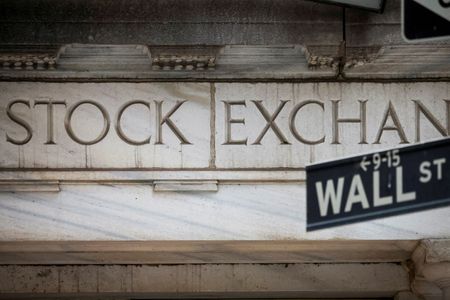 1
1 1
1
By Nell Mackenzie and Harry Robertson
LONDON (Reuters) – Wall Street was tipped for a strong open on Tuesday, while the cost of insuring against a U.S. debt default fell and the safe-haven dollar weakened in a sign of broad optimism across markets that a U.S. debt ceiling crisis might be averted.
U.S. markets reopen on Tuesday following Monday’s public holiday, reacting for the first time to a weekend deal to suspend the $31.4 trillion U.S. debt ceiling until 2025 while keeping some costs flat.
The U.S. House Rules Committee said it will meet at 3:00 p.m. ET (1900 GMT), to discuss the debt ceiling bill. A handful of Republican lawmakers have said they will oppose the agreement, in a sign that the bipartisan effort could face a rocky path through Congress.
Still, for now, investors appeared to be looking on the bright side.
U.S. stocks looked to open higher, led in pre-market trading by S&P and Dow Jones futures which were up 0.54% and 0.18%, respectively. World stocks were a touch higher.
U.S. 10-year Treasury yields fell about 10 basis points (bps) to 3.72%, while thirty-year yields fell 8 basis points to 3.90%. Bond yields move inversely to price.
Florian Ielpo, head of macro at Lombard Odier Asset Management, said that a curtailed U.S. government spending plan limiting U.S. debt levels might have led markets to question the country’s creditworthiness, even if marginally.
News of a possible deal has been as good for bonds as equities, he said.
“What is currently happening since yesterday shows where the debt ceiling premium was actually priced: mostly in bonds,” said Ielpo.
This optimism played out in other assets such as derivatives and currencies.
The dollar index, measuring the currency against six peers, steadied at 104.3 after rising to a two-month high.
The cost of insuring exposure to a U.S. debt default meanwhile fell. One-year credit default swaps narrowed 15 bps points from Monday’s close to 118 bps, data from S&P Global Market Intelligence showed.
ING senior rates strategist Antoine Bouvet said Tuesday’s bond rally might have less to do with the debt ceiling and more to do with thin trading around Monday’s public holidays.
“I wouldn’t blame the Treasury rally on the debt ceiling deal necessarily… the additional T-bill issuance, quantitative tightening, and difficult bank funding conditions now conspire to less favourable financing conditions to the economy,” said Bouvet.
Energy markets took a more pessimistic view that hard-right Republican lawmakers might block the deal.
Brent Crude was last down 2% to $75.54 per barrel. U.S. West Texas Intermediate (WTI) crude was down 1.89% to $71.31.
(Reporting by Nell Mackenzie and Harry Roberston; editing by Dhara Ranasinghe and Sharon Singleton)